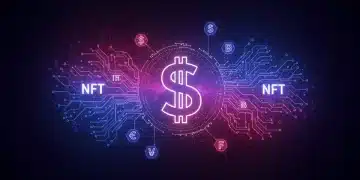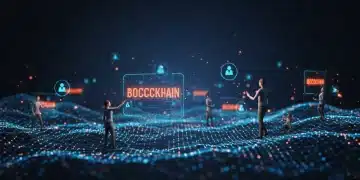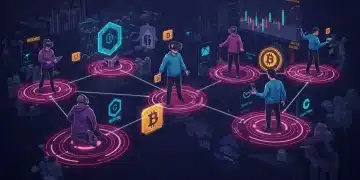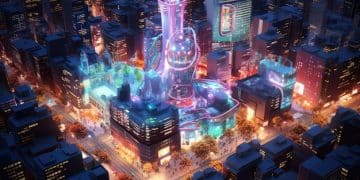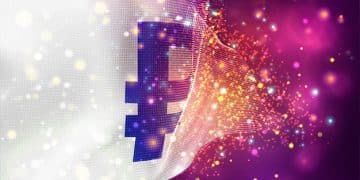Web3 & Creator Economy: US Artists’ New Power

Web3 and the Creator Economy: Empowering Artists and Musicians in the US through blockchain technology, NFTs, and decentralized platforms, offering new avenues for monetization, direct engagement with fans, and greater control over their work.
The convergence of Web3 and the Creator Economy: Empowering Artists and Musicians in the US is reshaping how artists and musicians create, distribute, and monetize their work. This evolution provides greater control, direct fan engagement, and new income streams.
Understanding the Web3 Revolution for US Creators
Web3 represents a paradigm shift from the traditional internet, emphasizing decentralization, user ownership, and blockchain technology. For US creators, this means new possibilities for controlling their content and connecting with their audience.
By understanding the core principles of Web3, artists and musicians can leverage these technologies to gain independence and forge stronger relationships with their fans.
Key Concepts of Web3
Web3 is built upon several key concepts that differentiate it from the centralized Web2. These concepts include:
- Decentralization: Distributing power and control away from central authorities to individual users.
- Blockchain Technology: Using decentralized ledgers to ensure transparency and security.
- Smart Contracts: Automating agreements between parties without intermediaries.
- NFTs: Representing unique digital assets that provide provable ownership.
These elements combine to create a more equitable and transparent ecosystem for creators.
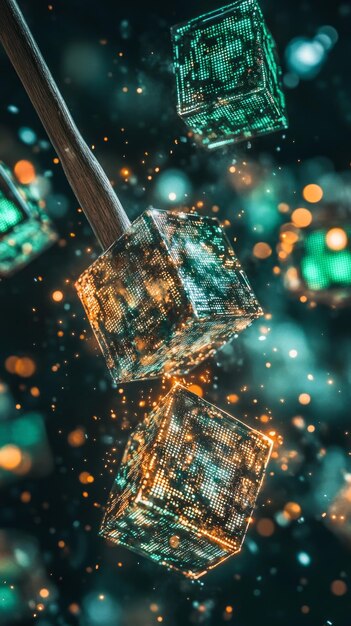
Web3 empowers creators by giving them tools to bypass traditional gatekeepers and connect directly with their fans, ushering in a new era of artistic autonomy.
NFTs: A Game-Changer for US Artists and Musicians
Non-fungible tokens (NFTs) have emerged as a revolutionary tool for US artists and musicians, offering new ways to monetize their work and engage with their fanbase.
NFTs provide a unique digital identifier, establishing verifiable ownership and authenticity of digital assets, opening doors for creators to sell their art directly to collectors and fans.
How NFTs Work for Creators
NFTs allow artists to tokenize their creations, turning them into unique, tradable assets. Here’s how:
- Tokenization: Turning artwork, music, or other digital content into an NFT.
- Smart Contracts: Using smart contracts to define ownership and royalties.
- Marketplaces: Listing NFTs on specialized marketplaces for sale.
- Direct Sales: Selling NFTs directly to fans and collectors.
This direct-to-fan model reduces the need for intermediaries, giving artists more control over their revenue streams.
NFTs are transformative, giving artists the tools to build a community around their work and share in the value they create.
Decentralized Platforms: Building Communities in the US
Decentralized platforms are changing how US artists and musicians connect with their fans by eliminating intermediaries and fostering direct engagement.
These platforms leverage blockchain technology to create community-driven spaces where creators can share their work, interact with their audience, and build a loyal following.
Advantages of Decentralized Platforms
Decentralized platforms come with several advantages for creators:
- Direct Fan Engagement: Connecting directly with fans without intermediaries.
- Community Building: Fostering a sense of community around their work.
- Transparent Revenue Models: Ensuring fair and transparent revenue distribution.
- Censorship Resistance: Reducing the risk of censorship and deplatforming.
These features combine to create a more empowering and equitable environment for artists and fans alike.
Decentralized platforms foster a sense of community, loyalty, and shared values, strengthening the bond between artists and their fans.
Monetization Strategies in the Web3 Creator Economy
The Web3 creator economy offers US artists new and innovative ways to monetize their work, transcending traditional models with more control and transparency.
With blockchain technology and NFTs, creators can diversify their revenue streams and connect with their audience on a more personal and rewarding level.
Innovative Monetization Methods
Web3 offers various monetization methods tailored for creators:
- Selling NFTs: Turning digital creations into unique, tradable assets.
- Tokenized Communities: Creating private communities accessible via tokens.
- Direct Fan Funding: Accepting direct contributions from fans via cryptocurrencies.
- Decentralized Streaming: Utilizing platforms that reward creators based on engagement.

These methods provide artists with sustainable, community-driven revenue streams that bypass conventional gatekeepers.
Monetization in the Web3 creator economy is about empowerment, allowing artists to receive fair compensation for their work and build lasting relationships with their fans.
Challenges and Opportunities for US Creators
While Web3 offers significant opportunities, US creators also face challenges that must be addressed. Understanding these obstacles is crucial for navigating this new landscape effectively.
Addressing these challenges requires education, community support, and the development of user-friendly tools and platforms.
Navigating the Web3 Landscape
Some of the challenges and opportunities include:
- Complexity: Simplifying the technological aspects of Web3.
- Scalability: Enhancing the capacity of blockchain networks.
- Regulation: Ensuring compliance with evolving regulatory frameworks.
- Accessibility: Making Web3 tools more user-friendly for non-technical users.
Overcoming these challenges requires collaboration, innovation, and a commitment to user-centric design.
By addressing these hurdles, US creators can fully harness the potential of Web3 and build a sustainable, thriving creative ecosystem.
The Future of US Artists in the Web3 Creator Economy
The future of US artists in the Web3 and the Creator Economy: Empowering Artists and Musicians in the US is bright, with opportunities for greater control, direct fan engagement, and diversified revenue streams.
As blockchain technology and decentralized platforms continue to evolve, creators will have even more tools at their disposal to realize their artistic visions and build sustainable careers.
The Web3 creator economy promises to reshape the creative landscape, empowering artists to connect with their audiences on a deeper, more rewarding level.
| Key Concept | Brief Description |
|---|---|
| 🔑 Web3 Basics | Decentralization, blockchain, and user ownership empowering creators. |
| 🎨 NFTs | Unique digital assets enabling direct sales and verifiable ownership. |
| 🤝 Decentralized Platforms | Community-driven spaces connecting creators directly with their fans. |
| 💰 Monetization | Innovative revenue streams like NFTs, fan funding, and decentralized streaming. |
FAQ
▼
Web3 is the next evolution of the internet, built on blockchain technology. It’s characterized by decentralization, user ownership, and enhanced security, shifting power away from large corporations.
▼
NFTs enable artists to tokenize their artwork, creating unique digital assets. This allows artists to sell directly to collectors, bypass intermediaries, and retain control over their creations.
▼
Decentralized platforms are online spaces built on blockchain, facilitating direct interactions between creators and fans. They offer transparent revenue models and reduced risks of censorship.
▼
Artists can monetize through NFTs, tokenized communities, direct fan funding, and decentralized streaming platforms. These methods offer greater control over revenue and foster deeper fan engagement.
▼
Challenges include the complexity of Web3 technologies, scalability issues with blockchain, regulatory uncertainties, and ensuring accessibility for non-technical users. Overcoming these requires collaboration.
Conclusion
The integration of Web3 and the Creator Economy: Empowering Artists and Musicians in the US presents a transformative opportunity for American artists and musicians. By embracing blockchain technology, decentralized platforms, and innovative monetization strategies, creators can forge a path towards greater autonomy, stronger fan connections, and sustainable careers in the evolving digital landscape.
